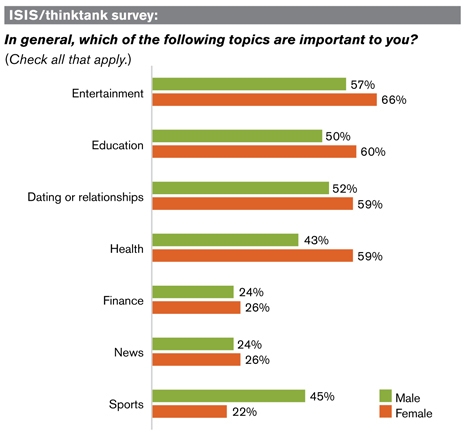What do youth do when they want to know where to get free condoms? They Google it!
Or, according to our recent survey and focus groups with youth aged 13-24, they go to Bing , Yahoo! or Ask.com.
Consider the search for free condoms in context: When asked what topics were important to them, 52 percent of young men and 59 percent of young women surveyed indicated dating and relationships, and 43 percent of young men and 59 percent of young women checked the box marked "health."
Now, fast forward and drill down. When asked for particular health information important to them, young men and young women were equally interested in fitness. Because we all know that six-pack abs are what ultimately helps you get the girl or guy into a relationship ...
However, when it comes to sexual and reproductive health topics, we see significant differences in what young men and young women find important. Females are a little more than three times (45 percent) more interested in issues of birth control and pregnancy, and five times (35 percent) more interested in menstruation. They are also more likely (44 percent) to be concerned about sexually transmitted infections (STIs) than males (33 percent).
These themes varied according to age, race/ethnicity and socio-economic status. But in general, younger teens are more apt to be concerned with their changing bodies as they leave puberty and enter adolescence. At this early stage, younger boys are most interested in learning "how to do it" and have questions about things that seem strange or gross to them, such as oral sex.
This brings us back to sexual education and search engines. If a young person turns to a search engine to find out "how to do it" what do you think they type in? As someone who's been answering health questions for the past 18-plus years (as Alice of Columbia University's GoAsk Alice , then AOL's Delilah and then Yahoo's first blogger, Ask Deb), I can tell you, the questions young people want answered are not phrased clinically. So when they search for health information online, they don't look for keywords or phrases like contraception or nutrition, but ask their very own personal questions in their very own personal ways.
What's your guess for most popular online search done by young people when seeking out health information?
